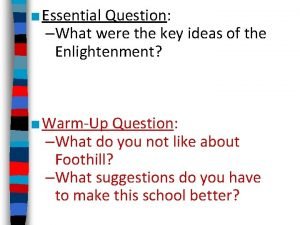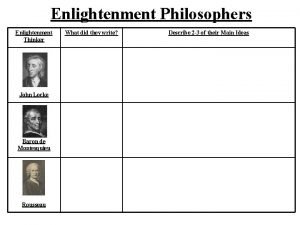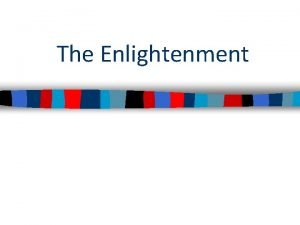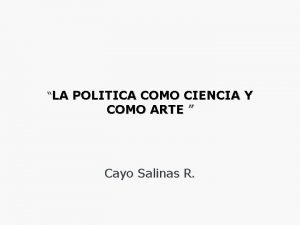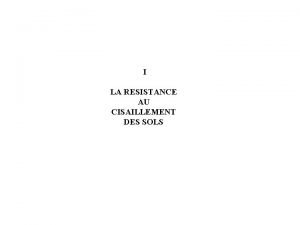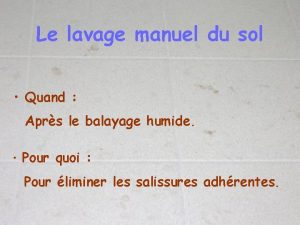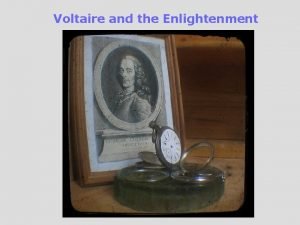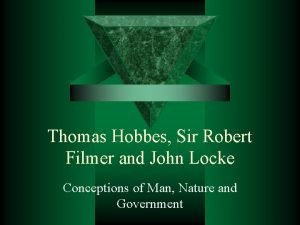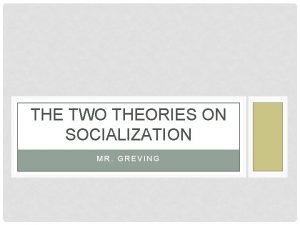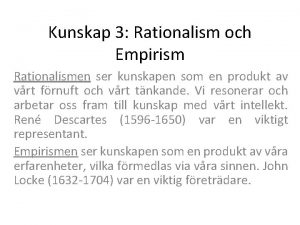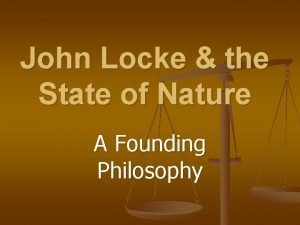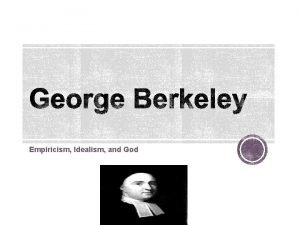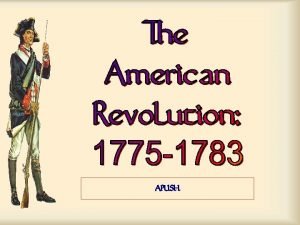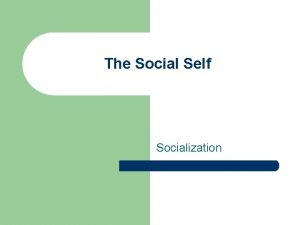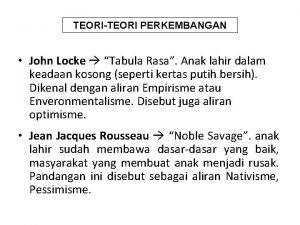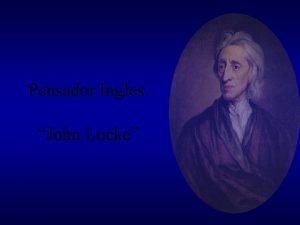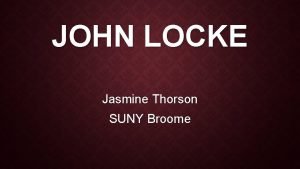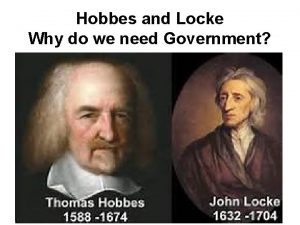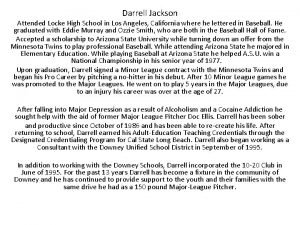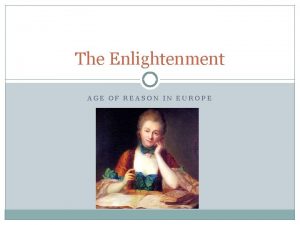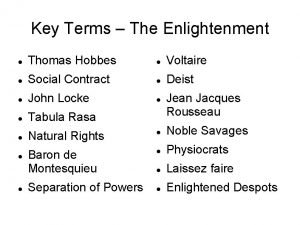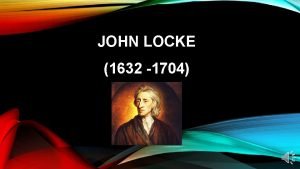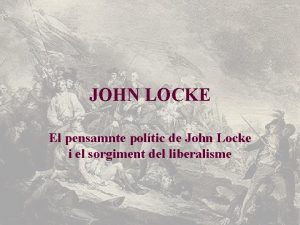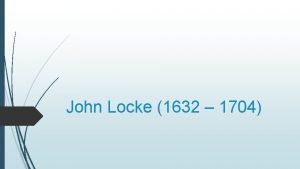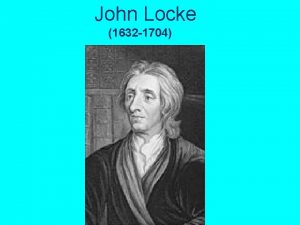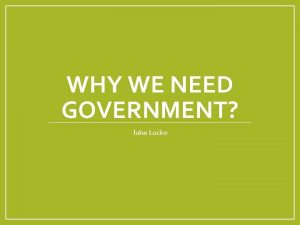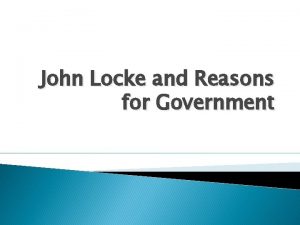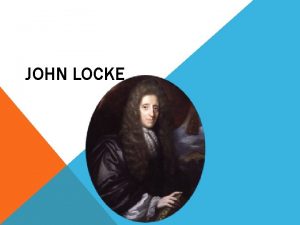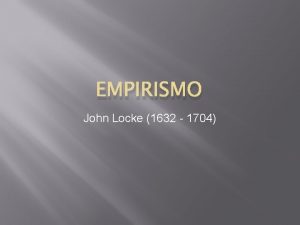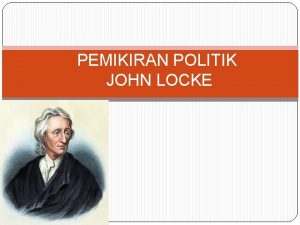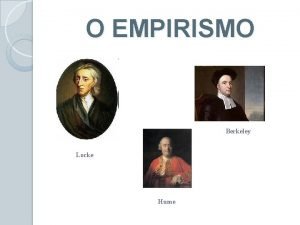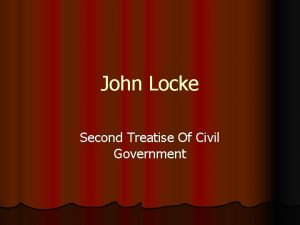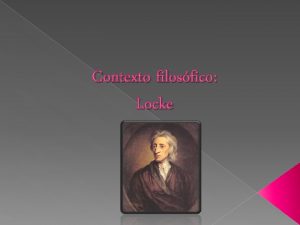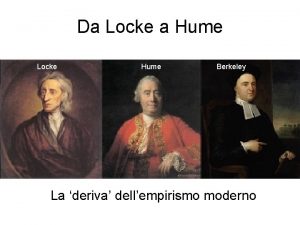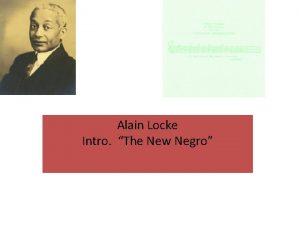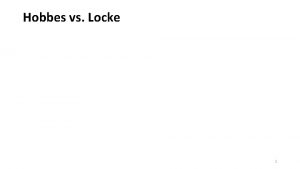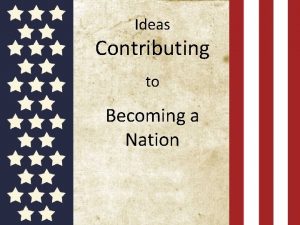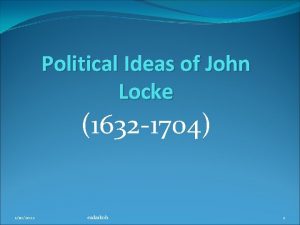THE SOLs The ideas of John Locke Common































- Slides: 31

THE SOL’s: The ideas of John Locke & “Common Sense” shaped the Declaration of Independence Unifying ideas for American democracy Differences between colonists separating from Britain Reasons the colonies won the Revolutionary War

� On the front page of your packet, put these in order of importance, according to you: � Happiness � Owning a House/Car � Health � Money � Freedom � Family � Religion

� What does it mean to “enlighten”? � The Enlightenment Period, which began in Europe (1600 s-1700 s), saw the development of new ideas about the rights of people and their relationship with their ruler/leader � John Locke: Enlightenment philosopher influenced the American belief in selfgovernment


� All people are free, equal, and have “natural rights” � Natural rights: life, liberty & property

� All power resides in the people, and they enter into a “social contract” with the govt to protect their rights � In return, the people obey the laws of their govt, creating a “ordered liberty” � Govt powers are limited to what the people allow it to have � If govt becomes a threat to people’s rights, the people can overthrow it

� These are radical thoughts – why? � It challenged old practice of dictatorial rule by kings, emperors, and tribal chiefs � So, does Locke’s beliefs reflect what we have in America TODAY? ?

� Thomas Paine was an English immigrant in America who produced a pamphlet known as Common Sense � What did it say? � It challenged the rule of the King of England over the American colonists � It was read by many colonists (mid 1700 s), and contributed to a growing sentiment for independence from Britain


� The ideas of Locke & Paine influenced the writings of the Declaration of Independence � Who stole the ideas? � Thomas Jefferson (VA) � Quotes: � “We hold these truths to be self-evident, that all mean are created equal, that they are endowed by their Creator with certain unalienable Rights, that among these are Life, Liberty, and the pursuit of Happiness”

� “That to secure these rights, Governments are instituted among Men, deriving their just powers from the consent of the governed” � “That whenever any Form of Government becomes destructive of these ends, it is the Right of the People to alter or abolish it, and to institute a new Government…” � Have you heard this before? ?

� The key principles of the Declaration of Independence increased political, social & economic participation in America for years to come � Creates equality, liberty & pursuit of happiness in this country

� The rivalry in North America between the British & French lead to the French & Indian War – the French were driven out of Canada and lands west of the Appalachian Mountains


� Effects of the French & Indian War: � Britain took several actions that angered the American colonies that would start the American Revolution � These are: � 1. Proclamation of 1763: nobody could settle west of the Appalachian Mts. � 2. Stamp Act, Tea Act, Sugar Act: new taxes to help pay for war costs


� Resistance to British rule in the colonies mounted, leading to war: � 1. The Boston Tea Party (1773)– colonists dumped a shipment of tea into the harbor in protest of the Tea Act � “No taxation without representation!” �Some were dressed as Indians for disguise

� 2. The First Continental Congress was called, all colonies participated except Georgia �This one is the 1 st time the colonies acted together as

� 3. Boston Massacre – British troops fired on anti-British demonstrators after they threw rocks and snowballs

� 4. War began when the “Minutemen” of Massachusetts fought a brief skirmish with the British troops at Lexington & Concord

� The colonists were divided into 3 main groups during the Revolution: � 1. Patriots: �Wanted complete independence from Britain �Inspired by Locke & Paine �Led by the words of Patrick Henry (VA) – “give me liberty, or give me death!” �Provided the troops for the American army, led by George Washington (VA)

� 2. Loyalists (Tories): �Remained loyal to Britain bc of culture and economic ties �Believed that taxing the colonists was justified to pay British troops for protecting Americans

� 3. Neutrals: �Many colonists who tried to stay uninvolved in the war

� Factors leading to colonial victory: � Diplomatic: � 1. Benjamin Franklin negotiated a Treaty of Alliance with France � 2. The war was not popular in Britain � Military: � 1. George Washington – general of the American army �Great military skills and leadership

� Americans benefited from the help of the French army & navy at the Battle of Yorktown, where the war ended with an American victory

� Battle of Yorktown (1781)

� British General Lord Cornwallis surrenders to George Washington




 Ideas of john locke
Ideas of john locke John locke enlightenment ideas
John locke enlightenment ideas John locke enlightenment ideas
John locke enlightenment ideas Ohn locke
Ohn locke Ideas principales de john locke
Ideas principales de john locke What is a sol
What is a sol Essai triaxial consolidé non drainé
Essai triaxial consolidé non drainé Lavage manuel du sol
Lavage manuel du sol Cigale spw
Cigale spw Voltaire and john locke
Voltaire and john locke Patiarcha
Patiarcha John locke vs thomas hobbes
John locke vs thomas hobbes John locke theory of socialization
John locke theory of socialization John locke empirism
John locke empirism John locke conclusion
John locke conclusion John locke nature nurture
John locke nature nurture Primary qualities locke
Primary qualities locke Pensamientos de locke
Pensamientos de locke Two treatises of government apush
Two treatises of government apush Self socialization definition
Self socialization definition John locke tabula rasa
John locke tabula rasa John locke birthdate
John locke birthdate A que se dedicaba john locke
A que se dedicaba john locke Agnes keene
Agnes keene State of nature examples
State of nature examples Darrell jackson baseball
Darrell jackson baseball Filósofos
Filósofos John locke enlightenment
John locke enlightenment Gagasan john locke
Gagasan john locke John locke identity
John locke identity John locke enlightenment
John locke enlightenment John locke wrington, birleşik krallık
John locke wrington, birleşik krallık
